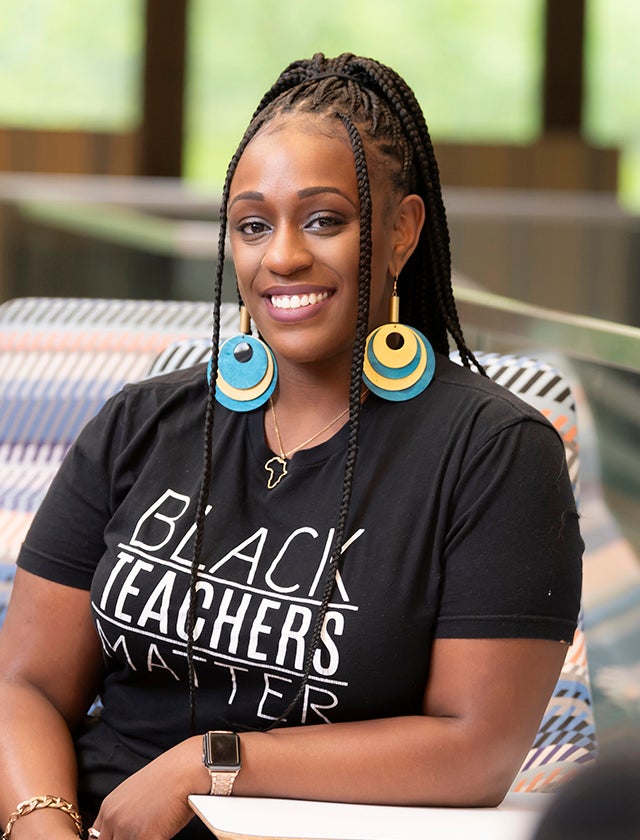
Subscribe to Pittwire Today
Get the most interesting and important stories from the University of Pittsburgh.A Maryland Teacher of the Year who leads with love.
For middle school teacher Brianna Ross, learning begins with love.
“I tell my students I love them all the time,” she says. “They’re like my children. I know I can push them.”
Ross taught history and social studies at Deer Park Middle Magnet School in Maryland’s Baltimore County Public Schools (BCPS), one of the nation’s largest districts. There, she challenges her students — most of whom are Black or Latinx — to ask critical questions about the world around them. She currently serves as the sixth-grade assistant principal.
Ross knows her presence as a Black teacher is important because all children, especially students from nondominant communities, need affirmation from positive role models who reflect their own identities.
For Ross, it goes way back to age 5 when her kindergarten teacher, Pamela Caruthers — one of the few Black teachers she ever had — made her feel loved and encouraged.
“Bri was two years ahead of her peers academically, and I had to find ways to challenge her,” says Caruthers, who has kept in touch with Ross over the years and thinks of her as family. “She helped me grade papers and mentored the other students.”
Caruthers’ recognition of her talents sparked in Ross a desire to become a teacher.
Years later, Ross moved from her hometown of Philadelphia to Pittsburgh to enroll in the Combined Accelerated Studies in Education (CASE) program in Pitt’s School of Education. Over five years, she earned a Bachelor of Science in applied developmental psychology and a Master of Education in special education, and became certified to teach Pennsylvania pre-K-4 general education and pre-K-8 special education.
“Pitt was such a great place to learn about how to be a teacher,” Ross says.
In 2014-15, she interned at Pittsburgh Langley K-8 — a public school in the city’s Sheraden neighborhood — from the very first day of school to the last. “I was so lucky to spend an entire year gaining valuable experience directly in the classroom.”
After graduating from Pitt (with Caruthers in the audience cheering her on), Ross moved to Maryland to teach.
The eight years since then have required not only love, but lesson plans that expand students’ critical consciousness and innovative adaptation.
In 2020, when the COVID-19 pandemic upended in-person learning and the nation reckoned with racism in the wake of George Floyd’s death, Ross got creative to engage and support students over Zoom. She offered them space to mourn and ask questions about news events in class. She launched a “joy assignment,” where students made videos celebrating moments of joy in their home culture to share — like cooking a family recipe or interviewing a family member who was part of a Black fraternity or sorority. During election season, Ross, who was also the chair of the social studies department, spearheaded schoolwide voting activities. Teachers and staff posted photos of themselves voting or mailing ballots, and students held a mock election, highlighting the importance of civic engagement while building community.
That year, Ross was nominated for and won the 2021-22 Maryland Teacher of the Year Award, chosen from among 24 finalists. She was also named a BCPS Superintendent Fellow, which “honors outstanding educators” and invites them to share teaching insights through community lectures and other outreach events.
Ross says she will always encourage others to become change-makers and continues to learn herself, too. As the equity liaison for her school and county, Ross leads trainings on race in the classroom and facilitates what she calls “courageous conversations” with teachers about diversity and bias. In a more public venue, she hosts a television talk show on the BCPS cable channel called “Amplify,” which gives people a chance to share personal experiences with teaching, racial dynamics in learning and more. In one episode, she interviewed a student who described the complexities of identifying as multiracial when most people think he looks white.
“I enjoy all those conversations and always learn something,” she says.
Ross is pursuing a doctorate in urban educational leadership at Morgan State University and hopes to lead transformative and culturally responsive schools in the future.
— Liberty Ferda



